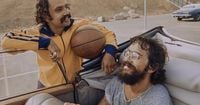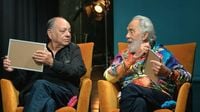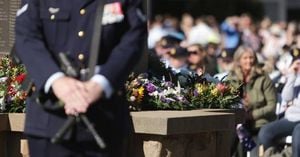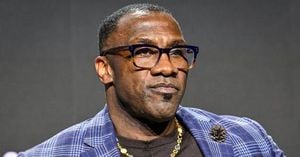Cheech Marin, 78, and Tommy Chong, 86, are back—not in a puff of smoke, but in full cinematic glory with Cheech & Chong’s Last Movie, a documentary that’s anything but traditional. Blending animation, archival footage, and their signature off-the-wall comedy, the film traces the five-decade friendship of one of comedy’s most iconic duos, who quite literally changed the game.
Generations of families have watched their films, with eager parents excited to show their children. With an unlikely duo like a Mexican-American and a half-Chinese Canadian coming together, they were a voice for those who have experienced hate because of what they looked like and questioned society with humor and rebellion. Through their stoner antics and sharp satire, Cheech & Chong challenged stereotypes, spotlighted cultural absurdities, and gave underrepresented communities a place to laugh, relate, and feel seen.
They weren't always understood, with journalists questioning their intelligence and their message. But the duo knew their "dumb" jokes had a lot of brains behind them. This new film, now in theaters, dives into moments of absurdity, with touching reflections on both the highs and lows of their journeys together. They had to overcome challenges like creative differences, jealousy, and bad contracts that led to them making pennies compared to what their films were grossing.
HOLA! had the opportunity to play a fun game with the comedic geniuses, and it's clear their chemistry is still intact. During the game, we asked when they were most proud of each other. “I was most proud of him when he became a US citizen,” Cheech said. “And I was most proud of you when you did Born in East L.A.,” Chong replied. "He set me free," Chong added.
Born in East L.A. was Marin's first solo project, with him serving as writer, director, and star. Released in 1987, the film was loosely based on a parody song he recorded with Cheech & Chong, but Chong declined to play a small part in the film, quipping in the documentary that he “didn't do extra work.” It marked a departure from the duo's usual format, showcasing Marín's ability to blend humor with social commentary about immigration, identity, and cultural misunderstandings. The movie became a cult classic and helped establish him as a filmmaker in his own right.
To this day, Marin has over 174 credits as an actor, 19 as a writer, 5 as a producer, and 4 as a director. The documentary doesn't just relive their greatest hits—it revisits the very roots of their wild journey, starting with a serendipitous meeting at a Vancouver strip club. From that first spark, they blazed a trail through sold-out tours, platinum albums, and box-office hits like Up in Smoke (1978) and Still Smokin (1983), which they both had different opinions about which was the most fun to make. “You always remember your first,” Marin said. “No matter what it was.”
Cheech & Chong’s Last Movie isn’t just a nostalgic trip—it’s a love letter to rebellion, redemption, people of color, and the wild ride of two guys who changed comedy forever. The documentary, directed by David Bushell, weaves never-before-seen footage from Marin and Chong as the two take another road trip—this time spanning five decades of their ultimately widely successful careers, which included platinum albums and box-office fame.
It was almost half a century ago that Cheech Marin and Tommy Chong teamed up for the first time on screen and told a lighthearted story about two pot-smoking buddies on a road trip. Over time, the 1978 movie Up in Smoke became a cult classic that transformed the two comedians and actors from hippie outsiders to comedy icons. Now, longtime Cheech and Chong fans or those who want to know more about them can see Marin and Chong reunite on screen in Cheech & Chong’s Last Movie, released nationwide Friday, April 25, 2025.
“They found the essence of Cheech and Chong. And that itself is worth exploring, because there’s a Cheech and Chong in everybody,” Chong said about the documentary in a joint video interview with Marin. "That’s who we are; we’re everybody out there. And that’s why people can relate to us.”
For many fans today, stoner comedy invites them into playful spaces that use humor to blur or soften social boundaries. Up in Smoke helped create and popularize a subgenre of later hits like Fast Times at Ridgemont High, Friday, Harold & Kumar Go to White Castle, and Pineapple Express, among many others. But when it first came out, Cheech and Chong's Up in Smoke was certainly not a hit with everyone. “Any film that asks you to go smashed before you see it must have something really bad to hide,” the late Chicago-based film critic Gene Siskel said on his award-winning movie review TV show “Siskel & Ebert.” Siskel picked Up in Smoke as a “Dog of the Week”—his choice for worst film—and criticized its dialogue, saying it was "80 minutes of two jerks saying nothing but ‘hey man.’”
Yet those two casual words, “hey man,” would nevertheless resonate with many fans and signal a generational change in mainstream culture. “In their sleepy, unshaven way, Cheech and Chong constitute a visual affront to the straight world just by walking down Main Street,” a 1978 New York Times review said. “It’s a revolution without danger, however, because, as the movie’s popularity shows, this particular revolution has already been won. The true eccentrics are no longer Cheech and Chong but the clean-shaven nitwits, like the cops in Up in Smoke, who persist in their attempts to uphold repressive traditions.”
Frederick Luis Aldama, a pop and Latino culture scholar who is the Jacob & Frances Sanger Mossiker Chair in the Humanities at the University of Texas, Austin, said in a phone interview that “if you really distill it, stoner comedy is a great equalizer. It puts the doormat out for everyone to generally enter that place. And it’s a reminder for a time and space where you can be yourself, let yourself go.” Aldama remembers seeing Up in Smoke with his maternal “abuelita” (grandmother). He remembers her “laughing uproariously” throughout the film, which made him laugh, too. It also gave him a sense of pride as a Latino, he said.
Marin grew up in East Los Angeles, the son of Mexican American parents; his father was a World War II Navy veteran and a Los Angeles policeman. Chong grew up in Calgary, the son of a Canadian mother with Scottish and Irish roots and a Chinese father. The comedians, Aldama said, brought elements such as Mexican American lowrider culture into the mainstream, but “they did it in a way where you weren’t asked to judge or laugh at it, but simply enjoy it and laugh with it. And this put a positive spotlight on our communities, our neighborhoods.”
Marin's and Chong's childhoods were separated by more than 1,500 miles, and different circumstances would ultimately bring them together in an unexpected way. Marin dodged the Vietnam War by moving to Canada. And Chong, who had been a guitarist for Bobby Taylor & the Vancouvers, said he lost his job in Motown. “I was just trying to get my life back together. And Cheech was trying to live with the fact that he had to live in Canada. And then we met,” said Chong. “We realized that we had this understanding.”
The seed for their understanding was planted at a Vancouver topless nightclub where Chong was a part-owner and had formed a hippie-burlesque comedy troupe. Marin would join the group as a writer. After years of success, the two went their own ways, and they have some frank discussions in the documentary about their relationship.
Asked whether comedy could still be transgressive, Marin says it can, as long as there is an authentic connection between the comedian and the audience. “It depends upon the right comedy and if it’s truthful comedy. It’s not the comedy that wants to please everybody. We want to please ourselves. And in doing so, [we] do something that’s relevant for the people,” said Marin. "I think that will keep happening, absolutely."
But for comedy to succeed today, Chong said, it can’t simply repeat what was done in the past. “We’re living, like, in a travelogue,” he said. “We’re no longer in the ’60s, the ’70s or the ’80s or the ’90s. We’re now. And so, in order to stay relevant, you got to acknowledge what’s going on now. Because we're alive and we're still breathing, we can still think about it.”
Asked whether this was really their "last" movie and what would get them together on screen again, Marin said, "Very easy, money!" "No, we're going to keep hammering until they take the cold, warm bong out of my hand," Chong said, as the two men laughed.





